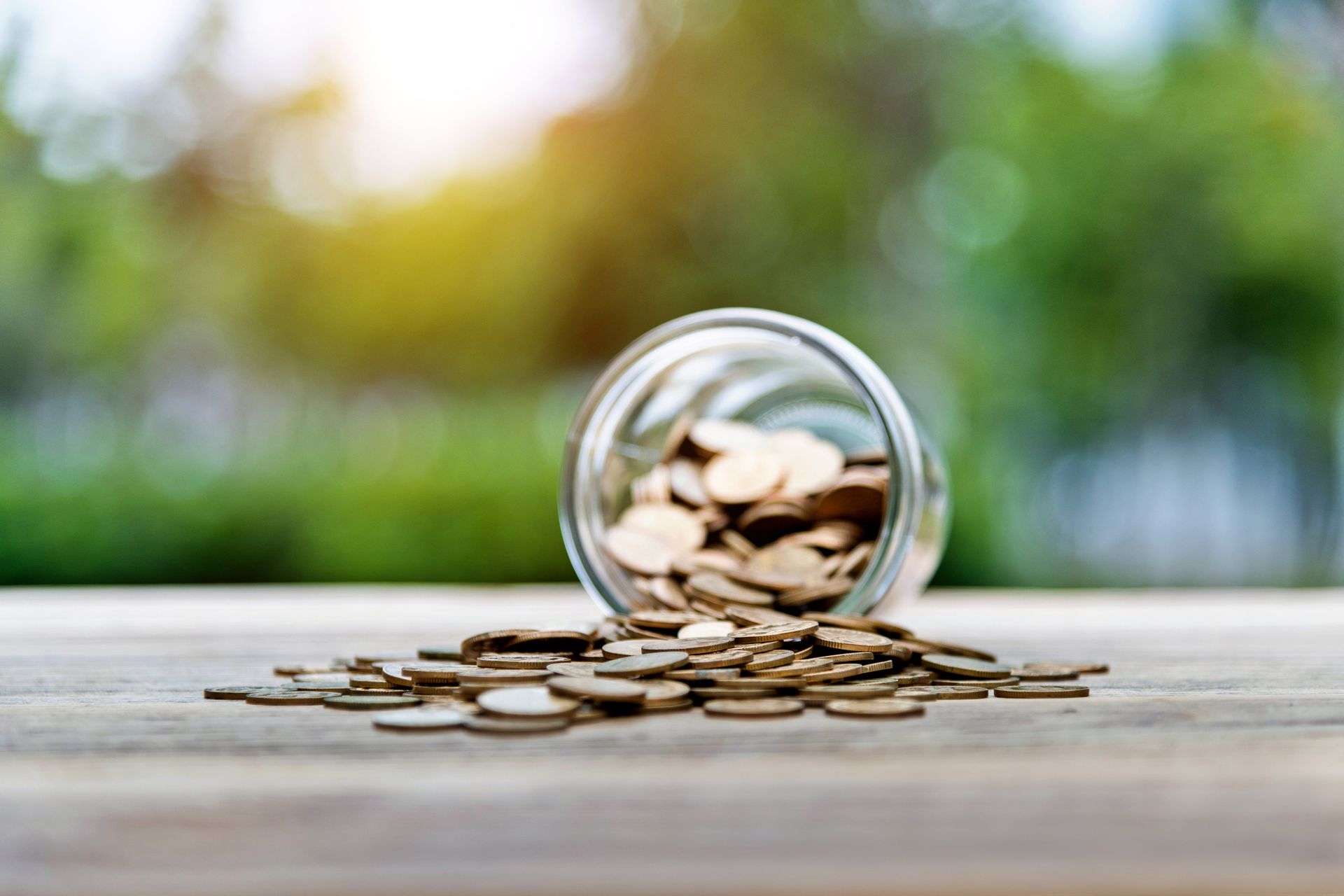Committed to those who’ve lost a spouse
The "B" Word
by Tim Hudson

Budgeting. On the best days, it can feel like a four-letter word.
After a loss, it seems impossible. But I’ll get back to that.
Chocolate & Coffee Creamer
For many years I have struggled with carrying around an extra 20 pounds on my frame. See, I really enjoy eating. And if it’s chocolate, why stop at two helpings? To offset this eating style, I decided to work out. As long as I work out, I can eat whatever I want, right? But the pounds kept coming, and my pants kept getting tighter. I needed some help.
I hired a nutritionist, and he made me start counting calories. Ugh. I didn’t think it would do any good. I thought I knew how many calories I ate per day. As it turns out, I had no idea how many calories I was eating and what the caloric content of some of my favorite foods were. My favorite coffee creamer had around 150 calories per cup, and I would drink two cups a day. Yikes!
After a couple weeks of counting calories, I discovered which foods I ate because I really liked them and which foods I ate out of habit. I went down from two cups of coffee to one and easily cut 150 calories out of my diet that I can use for something I like more. Chocolate, anyone?
So how does this story relate to budgeting, especially after you have lost a spouse? Budgeting, like counting calories, can reveal a lot about your spending habits. You may not be aware of what you’re spending, like my coffee creamer. Hopefully these next few paragraphs will give you some things to consider that may be of benefit to you.
At First, Simplify
If your spouse recently passed away, please do not feel the pressure to come up with a budget immediately. I advise newer widows to put a lump sum in their checking account -- usually 3-6 months of what you think it will cost to pay all of your bills. Remember, this is not the time to be exact down to the penny. This is the time to have one less thing to worry about. You may wonder where you might get this money. I would advise taking it from life insurance proceeds, an investment account, or another source you may have access to. The most important thing at this time is to allow yourself to grieve.
I am not advocating spending wildly. I am just saying that paying a few late fees won’t hurt you in the long run. Giving yourself a little grace and room to breathe can be helpful when you feel like your world is upside down and you are trying to find a new normal.
Hold on Big Decisions
Also, do not make any major or irreversible financial decisions in the first 6-12 months. You may have to sell the house or the extra car, move closer to the kids, or buy an investment product you don’t understand, but all of these decisions can wait. Too often widows tend to make a permanent decision that cannot be reversed -- or reversed without great financial or relational cost. If this is something that you are thinking of doing, ask yourself: Why do I have to make this decision now? Will waiting affect the decision?
You may want to talk to an unbiased third party you trust, who can walk you through the pros and cons of these decisions. Some of the most rewarding work I get to do with widows is walk them through some of these decisions. Interestingly, most of the time when I have one of these conversations, I feel like I am the one that learns something.
Take a Look: Track
When you’re ready, I encourage you to track your receipts for one month without making any changes. Don’t curb your spending yet. Just start paying attention. Every time you buy anything -- from coffee at the gas station to a meal out with friends or family to gifts or a pack of gum at the grocery store – keep the receipts. After the month is up, put all of your receipts on a table. Go through them, asking yourself: What helps me live life to the fullest? (For me – you guessed it – CHOCOLATE.) Then ask yourself: What am I spending out of habit? Like my coffee creamer, what do you spend mindlessly that really doesn’t add to your joy? (Now, be sure you are deciding for yourself, not taking advice from a family member or some book or a well-intentioned friend.)
Once you see how you spend your money, you can make a more educated decision on what to keep spending money. You will be able to use your money on what you enjoy and what serves a purpose in your life. And you will see what you can potentially get rid of -- things that don’t bring a lot of joy to your life. If this seems a little overwhelming, it may be good to talk with a financial advisor or an unbiased friend that can be a sounding board for you.
One other thought: money, like food, has been used for a long time to cover up or mend something that you are not comfortable with in your life or you are trying to hide. Although I am not a counselor, I do believe that having these harder conversations with ourselves or someone who is trained to help you may be of great benefit.
Make it Work for YOU: Build
After you establish where you are with your spending, you can then start to build a budget based off of what your needs are -- mortgage, car payment, power bill, water bill, and things that you have to have to live. You will then see what you have to spend on discretionary items – things that make your life enjoyable and get you excited about your day. Again, I cannot stress enough -- please do not let someone influence you about what should be important to you or what you should cut out. If going to Starbucks every morning for a cup of coffee is really fun for you, and this is a way you choose to spend your discretionary money, go for it! After all, if you are ever at a Starbucks in South Carolina and see some tall guy drinking a soy latte, come and say hi.
Go with the Flow: Flexibility
Sometimes we think that once we have a budget, we have to stick with it forever. I strongly disagree with this idea. Budgets are fluid and can be changed from month to month. Some months you may spend more on gifts, some months you may travel more, and some months you may entertain more. That is the beauty of having a budget that can change every month. Most likely your needs won’t change much from month to month. It is the wants that will change. So if you know that you are going to spend more in December on gifts, maybe cut back for that month on some wants and just put them off for a month or two. You are in charge and can decide how you want to do this.
Credit Cards
The classic question: Why not put a little on your card and pay it off later? Especially during the summer months when we travel more, or during the holiday season when expenses tend to soar. If you do not have the money to cover the expenses, NEVER EVER put money on a credit card. It is a trap that is designed for you to lose every time. According to LendingTree, Americans have over $928 billion in credit card debt (1). Credit card debt is a mountain that is really hard to get out from under, so please do not ever use a credit card if you don’t have the money to pay it off every month. If you use credit cards, be careful to always have the money available before you buy something. And only buy what you were planning to buy. Avoid extra stuff that you don’t need. I personally use credit cards for the traveling perks and the points, but it is not for everyone. If you don’t like this idea, that is completely fine.
If you have gotten this far and you want some more resources, please feel free to visit our website, www.voyagefinancialpartners.com. We have many helpful complimentary resources that you can use. If you would like some help with your budget, or if you just want a listening ear, feel free to reach out. We will gladly help you or refer you to someone that can. helpinghand@voyagefp.com or 843-285-7076.
@2023 Voyage Financial Partners, 300 N Cedar Street, Suite A, Summerville, SC 29483
Securities & Advisory Services offered through CreativeOne Securities, LLC Member FINRA/SIPC & an Investment Advisor. Voyage Financial Partners & CreativeOne Securities, LLC are not affiliated.
- https://www.lendingtree.com/credit-cards/credit-card-debt-statistics/



